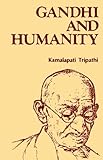Gandhi and humanity
By: Tripathi, Kamalapati.
Contributor(s): Pandeya, Prabhat Kumar (Tr.).
Publisher: New Delhi Atlantic Publishers 1993Description: xv, 248p.ISBN: 817156335X.Subject(s): Gandhi, Mahatma 1869-1948 -- Philosophy -- Political and social views | Humanism -- History 20th Century | National movement -- Non-violence -- IndiaDDC classification: 954.035 Summary: This is an academic book on comparative political thought with focus on Gandhian political philosophy. Writ?ten against the background of the Second World War in 1945, the book analyses the politico-economic causes of the two World Wars and discus?ses some political systems along with the Gandhian system, which establishes its superiority and relevance to modern world. The 291 page book in Hindi was awarded the Mangala Prasad Paritoshik, a prestigious award in the Hindi world. The cultural roots and implications of Gandhian philosophy have also been discussed quoting freely from Hindu scriptures. The book's originality lies in the author's successful attempt to connect Gandhian system with Indian culture and philo?sophy and how the Indian approach to the life and world differs from that of the West. Without boasting to be a Gandhi specialist, the writer says, "I have tried to present Gandhi the way I have understood him. The only objective is to attract the attention of thinking society towards the ideas of the man who is inspired merely by welfare of the world, from whose each pore the painful music of trampled humanity is echoing...I ventured to write in spite of my limitations because I am a devotee of Hindu culture." Being a student of History, the writer has a perceptive historical sense which provides him a mature perspective to world problems. Documented with contemporary scholarship, the book also contains a table of the then world industrial force. Though written in jail in 1945 the book has relevance today because of world situation and the fact that Gandhi's vision is still relevant. The book should prove use?ful to the student, researcher, and general reader both in the country and abroad. About Author: Kamalapati Tripathi (1905-1990) the writer, journalist, editor and freedom fighter was one of the few public figures who are capable of wielding power and pen with equal ease. He had written ten books on subjects ran?ging from| Item type | Current location | Collection | Call number | Status | Date due | Barcode |
|---|---|---|---|---|---|---|
 Special Collection- M.K. Gandhi, Guru Nanak Dev ji
Special Collection- M.K. Gandhi, Guru Nanak Dev ji
|
NASSDOC Library | Mahatma Gandhi | 954.035 TRI-G (Browse shelf) | Available | 50767 |
Includes Index
This is an academic book on comparative political thought with focus on Gandhian political philosophy. Writ?ten against the background of the Second World War in 1945, the book analyses the politico-economic causes of the two World Wars and discus?ses some political systems along with the Gandhian system, which establishes its superiority and relevance to modern world. The 291 page book in Hindi was awarded the Mangala Prasad Paritoshik, a prestigious award in the Hindi world. The cultural roots and implications of Gandhian philosophy have also been discussed quoting freely from Hindu scriptures. The book's originality lies in the author's successful attempt to connect Gandhian system with Indian culture and philo?sophy and how the Indian approach to the life and world differs from that of the West. Without boasting to be a Gandhi specialist, the writer says, "I have tried to present Gandhi the way I have understood him. The only objective is to attract the attention of thinking society towards the ideas of the man who is inspired merely by welfare of the world, from whose each pore the painful music of trampled humanity is echoing...I ventured to write in spite of my limitations because I am a devotee of Hindu culture." Being a student of History, the writer has a perceptive historical sense which provides him a mature perspective to world problems. Documented with contemporary scholarship, the book also contains a table of the then world industrial force. Though written in jail in 1945 the book has relevance today because of world situation and the fact that Gandhi's vision is still relevant. The book should prove use?ful to the student, researcher, and general reader both in the country and abroad. About Author: Kamalapati Tripathi (1905-1990) the writer, journalist, editor and freedom fighter was one of the few public figures who are capable of wielding power and pen with equal ease. He had written ten books on subjects ran?ging from


There are no comments for this item.